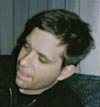 JOSEPH HANSEN
JOSEPH HANSEN
THE GIFT
Stephen sits at his desk and types his name: s-t-e-p-h-e-n---b-a-r-r-y. He types it again. “How’s the report coming?” asks a head in his doorway. “Fine,” says Stephen. He types: s-t-e-p-h-e-n---b-a-r-r-y. Another head, a superior. “A-OK,” says Stephen. He types his name. He types it again. He has no great interest in typing his name. He types his name simply so others can hear he is typing. Sometimes he switches the letters, to change the beat, otherwise the same thirteen keys (including the space bar) in the same sequence creates too much of a rhythm, and others might notice. If others notice, they may deduce that typing a report does not yield such a rhythm, and they may conclude that Stephen is not typing a report. But Stephen cannot bring himself to type a report. He happens to be very skilled at typing reports, an ability he would call a gift. But why should I be a slave to this gift? he asks himself. I did not ask for this gift, it was forced on me; something - God, Biology, Nature - forced it down my throat. He would rather pursue other endeavors, ones for which he possesses no gift. For he would always question whether he had chosen the new endeavor of his own volition or were merely acting out of an implied obligation to the gift. He wonders if this is the case with his present interest in report-typing. He had in the beginning possessed passion for report-typing, had devoted his early life to refining his present skill; but he now questions this passion. He had told himself, in the beginning, that report-typing was an admirable endeavor, one that lit afire something in his soul; but he now wonders if what he took for soul-fire was really just self-awareness that he is naturally good at something. He now acknowledges that maybe there is nothing to report-typing in itself that merits the praise he had for the past fifteen years bestowed upon it. He wonders, for example, if those passionate painters exhibited in galleries worldwide would be so passionate without the gift they possess, a gift they did not ask for. It is possible, he thinks, they are simply succumbing to a perceived obligation to act in accordance with their gift, and have, therefore, raised the object of their gift to high esteem. This is highly probable, he thinks. At least he feels this is what he has done with report-typing. He has forgotten his motto: Choose thyself. So time to move on. Time to choose a new endeavor, he says out loud. And immediately he chooses whaling, of all things, something utterly foreign to him, chosen at random, an activity he feels no natural pull towards whatsoever. He wonders if whaling has been rendered illegal. He knows nothing of whaling, had skipped over the technical chapters of Moby Dick years ago, but assumes if there are whalers they still use sleek harpoons fired from tubes off the decks of dirty ships. He will research and find there still are whalers in the world. He will perform terribly at this new endeavor, will be mocked and ridiculed, scolded and beaten, thrown overboard on several occasions; and it will not bring him joy, nor satisfaction, only frustration, and he will be happy to have chosen this life of joylessness and dissatisfaction, this chosen life of his.
But actually, probably, whaling has been outlawed, Stephen thinks. The Save-the-Whalers have surely made that much progress. So Stephen continues to type his name, frustrated, the same thirteen keys (including the space bar). He types his name over and over. He types his name caught in the rhythm of typing until a sharp pain interrupts, and he knows his three cups of tea demand release. He stands, then he sits. He repeats the motion. He stays where he is. The pressure in his bladder intensifies but he does not move. It is time to be consistent, he thinks. Time to take a stand. I will not heed nature, for to truly choose is to act against nature. So he remains seated despite the bodily demand. This will be my statement, Stephen says, I would rather my bladder burst than remain subjected any longer. I will be a martyr for the cause. I will die the death of Tycho Brahe, the great astronomer, who had himself died of an exploded bladder.
But Stephen is not as lucky as the great astronomer, his body takes over, and three cups of urine puddle down his leg, soak into his sock and drip into the mouth of his shoe.
And later, on the bus ride home, the odor will be unmistakable. The woman seated next to Stephen will make a face to the man standing beside her, but Stephen will not notice. He will be lost in the thought, calculating whether or not the stickiness down his leg signals triumph or defeat. Martyrdom requires sacrifice, but to what effect, and even in secret? After contemplating this for the duration of the ride home, he will come to no conclusion on the matter. He will enter his apartment, shower, and slide into his bed. Then, like most nights, he will lay awake fighting the tyranny of sleep. When his eyelids become heavy and dreams start to roll in, Stephen will focus on the ceiling and think his own thoughts. Slowly these thoughts will reveal an independent life, move in directions despite Stephen. Without intention his eyelids will close. And Stephen will retreat, mingling with the enemy, not realizing until next morning that he has again lost.
© Joseph Hansen 2010
This story may not be archived, reproduced or distributed further without the author's express permission. Please see our conditions of use.
The Barcelona Review is a registered non-profit organization
